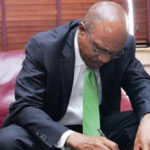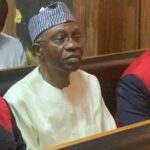By Sunday Michael Ogwu, with agency report
Nigeria’s dollar debt surged after the surprise weekend ouster of the Central Bank Governor, Godwin Emefiele, as fresh comments on merging multiple exchange rates added to signs that President Bola Tinubu is resetting policies blamed for crippling Africa’s biggest economy.
Investors have welcomed the change because it signals a move away from unorthodoxy under the former bank chief.
Emefiele’s policies – including allowing a complex regime of multiple exchange rates – had long been criticised by investors, economists and institutions like the World Bank.
Under his tenure, the central bank also loaned the government of former President Muhammadu Buhari 22.7 trillion naira ($49 billion), helping push public debt to a record 77 trillion naira.
The notes maturing in 2051 rose more than 3 cents on the dollar to as high as 73.74, the biggest gain this year.
Tinubu suspends Emefiele, orders probe
UPDATED: DSS grills Emefiele after suspension by Tinubu
The premium investors demand to hold Nigerian debt over US Treasuries fell 46 basis points to 710, the biggest drop this year, according to a JPMorgan index.
‘Naira may weaken to 700 to dollar’
The current naira exchange rate of 471.92 naira to the dollar may likely need to be adjusted to about N700 to N750, closer to the current black market rate, JPMorgan said in an investment note on May 31.
The naira has closed lower for three consecutive days, its longest streak of losses since May 12. Analysts expect that the currency could trade anywhere between 650 and 750 to the dollar as Nigeria allows it to trade more freely.
A naira at that level, combined with President Bola Tinubu’s decision to remove fuel subsidy “means the government does not have (to) borrow as much, just to pay interest on debt,” Head of strategy at FIM Partners, Charlie Robertson, said in a series of posts on Twitter.
Unified rates
Wale Edun, an influential member of Tinubu’s advisory board, told Bloomberg by phone on Monday that the unification of exchange rates was “imminent”.
He noted that, “I would say it would have to be done within a quarter rather than within a year.”
Under Emefiele, Nigeria’s central bank offered the dollar through several windows at tightly controlled rates, with little liquidity to businesses and individuals. This forced many to the black market, where the dollar traded more freely but at about a 60 per cent premium to the official rate.
Emefiele was widely seen as acting in lockstep with the administration of Tinubu’s predecessor, Buhari. That government was perceived to be more statist and socialist in its approach, said Yemi Kale, chief economist for Nigeria at KPMG LLP and the nation’s former statistician general.
“The markets will respond positively to an administration it believes to be more market-oriented,” Kale said.
“To be credible, the implementation of policy changes would most likely need a new team,” Ayo Salami, chief investment officer at Emerging Markets Investment Management Ltd in London, said via email, explaining the market reaction to Emefiele’s ouster.

 Join Daily Trust WhatsApp Community For Quick Access To News and Happenings Around You.
Join Daily Trust WhatsApp Community For Quick Access To News and Happenings Around You.


